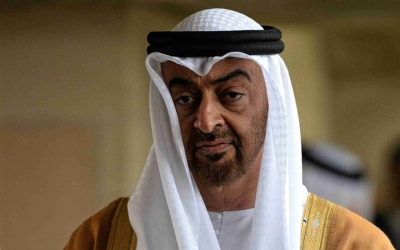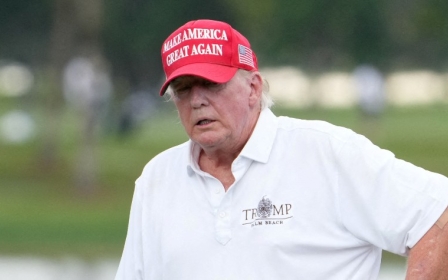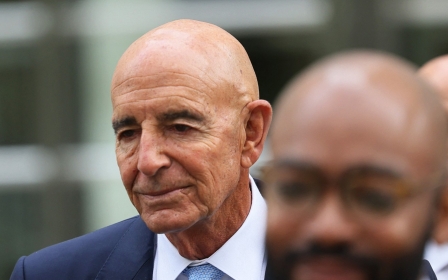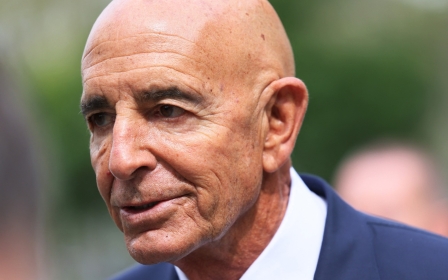Gulf states splurged on Trump hotel rooms during Qatar blockade 'lobbying blitz'
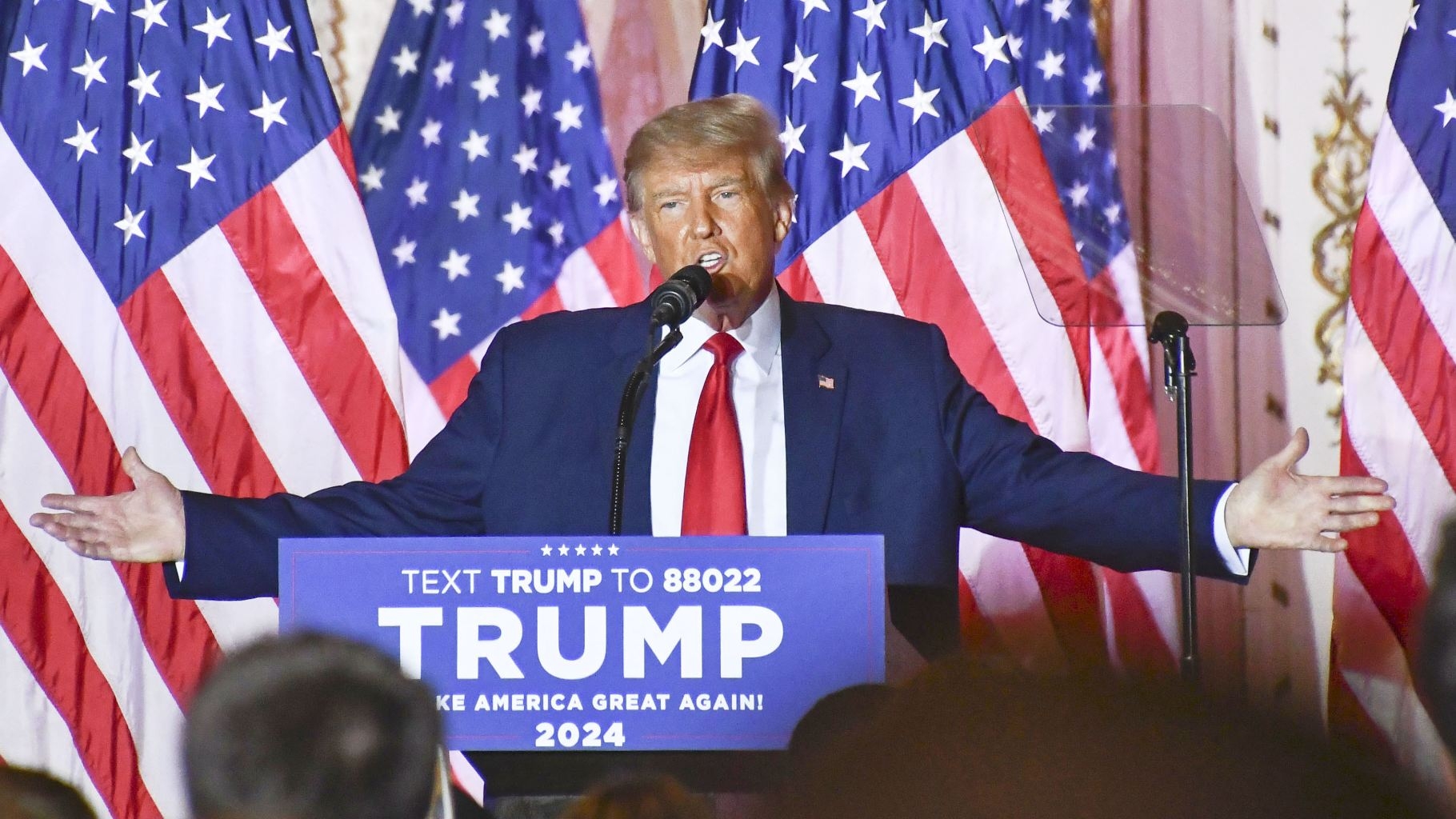
Newly released documents reveal the extent of rival Gulf states' spending at Donald Trump's Washington DC hotel as they sought to influence the US president at the height of the Saudi-led blockade of Qatar.
The documents are set to raise fresh questions about Trump's dealings with Gulf states, and whether he sought to profit from those relationships, as he announced on Tuesday that he would run again for the Republican presidential nomination in 2024.
They show that the governments of Qatar, Saudi Arabia and the United Arab Emirates spent more money than previously known at the Trump Hotel in Washington DC at the same time as all three Gulf states were publicly lobbying for Trump’s support during the blockade.
The documents were released this week by a congressional committee that obtained them as part of an investigation into whether Trump distorted US foreign policy to serve his own financial interests during his 2017-2021 presidency.
Carolyn Maloney, a Democratic congresswoman and the chair of the Committee on Oversight and Reform, said the documents showed hundreds of thousands of dollars had been spent at the Trump hotel by foreign governments at sensitive times for those governments’ relations with the US.
“These documents sharply call into question the extent to which President Trump was guided by his personal financial interest while in office rather than the best interests of the American people,” Maloney said.
The Gulf states’ lobbying campaign in Washington - referred to by Maloney as a "lobbying blitz" - came after Saudi Arabia and allied states including the UAE imposed a blockade on Qatar and cut off diplomatic ties with their regional neighbour in June 2017.
According to the documents released by the oversight committee, the Qatari government and associated entities spent more than $300,000 at the Trump hotel in three months prior to a visit to the White House by Qatar’s ruler, Sheikh Tamim bin Hamad Al Thani, in April 2018.
“Between January and early March 2018, the Sheikh Al Thani Family, the ruling family of Qatar, booked an extended stay at the Trump Hotel, spending at least $282,037,” the committee said.
It noted that on several occasions in that period, a room at the hotel was also booked by the president’s daughter, Ivanka Trump, and her husband, Jared Kushner, who was also Trump’s adviser on the Middle East and is said to have built close relations with a number of Gulf royals including Saudi Crown Prince Mohammed bin Salman, known as MBS.
A Qatari government official told Middle East Eye the committee's findings were "inaccurate" and suggested that the hotel spending linked to Qatar in the report had nothing to do with the country's government or its embassy in Washington.
The spokesperson added: "The State of Qatar is working to address the misinformation directly with the Oversight Committee in order to prevent further amplification of a false narrative. The individuals named are private citizens, and the business entity named has no government ties.
"We respect the Oversight Committee’s commitment to due process, but it is equally important that they correct these inaccuracies and promote the truth instead of misleading interpretations."
The committee noted that Trump, during Sheikh Tamim's visit to Washington, had referred to the Qatari ruler as a “great gentleman” and praised Qatar’s record of combatting terrorism.
Qatar’s Gulf rivals had accused it of sponsoring terrorism, which Doha denied, and Trump had earlier appeared to endorse those accusations in tweets supporting the blockade.
The committee said Saudi and Emirati officials had also spent at least $164,928 at the Trump hotel between late 2017 and the middle of 2018.
It noted Trump had fired his then-secretary of state Rex Tillerson in March 2018 at a time when Saudi and Emirati delegations were staying at the hotel and had “reportedly been lobbying Trump to remove [Tillerson] for his role in intervening to stop a Saudi invasion of Qatar the previous summer”.
“From March 7 to March 14, 2018, the Saudi Ministry of Defense spent $85,961, including renting several $10,500-suites - the most expensive rooms at the Trump Hotel. Although the identities of the Saudi delegation members staying at the hotel are anonymized, two of the officials staying in suites are referred to as “His Excellency,” indicating that the Saudi Royal family or senior government ministers were patronizing the Trump Hotel,” Maloney wrote in a letter to the US national archives requesting further documents relevant to the investigation.
Tillerson’s sacking also came days before Trump met MBS, calling him a “big purchaser of equipment and lots of other things”, and subsequently approved the sale of $1.3bn in arms sales to the Saudi government despite concerns raised in Congress.
In the letter, Maloney said that Trump’s UAE-linked property also saw a “jump in patronage” in 2017 and 2018, noting that management fees at his golf course in Dubai increased from $141,484 in 2017 to $314,579 in 2018.
The letter also cited a recent story in the Washington Post which reported that US intelligence officials had “compiled a classified report detailing the Emirati government’s systematic efforts to manipulate US foreign policy in its favor by exploiting ‘the vulnerabilities of American governance’”.
Trump’s relationship with Saudi Arabia’s crown prince faced further scrutiny in October 2018 following the murder of journalist Jamal Khashoggi, a US resident, inside the Saudi consulate in Istanbul in an operation that the CIA later assessed had been approved by MBS.
The committee also highlighted spending by the Turkish embassy and Turkish government-linked lobbyists totalling more than $86,000 at the Trump hotel in 2017 and 2018, coinciding with a visit to Washington by Turkish President Recep Tayyip Erdogan and a US investigation into Halkbank, a Turkish state-owned bank.
The committee noted that Trump had subsequently told Erdogan that he would ensure the Halkbank prosecution would be dropped.
The case is ongoing, however. Last month, the US Supreme Court agreed to hear Halkbank's argument that it should be immune from prosecution because it is majority-owned by the Turkish government. The bank has pleaded not guilty to charges including bank fraud and money laundering over accusations that it helped Iran evade economic sanctions.
Trump’s financial relationships with Gulf states continue to face scrutiny. The New York Times reported this week that Trump’s family company had signed a deal worth $1.6bn with a Saudi property developer to license its name to a housing and golf complex in Oman.
In comments to the New York Times following publication of the oversight committee's documents, Eric Trump, the executive vice president of the Trump Organization, said that any profit made by the family company from visits to the hotel by foreign dignitaries was returned to the US government through a voluntary annual payment.
Eric Trump said: "As a company, we went to tremendous lengths to avoid even the appearance of a conflict of interest, not due to any legal requirement, but because of the respect we have towards the office of the presidency.”
Middle East Eye has contacted the embassies of Saudi Arabia, the United Arab Emirates and Turkey for comment.
Middle East Eye propose une couverture et une analyse indépendantes et incomparables du Moyen-Orient, de l’Afrique du Nord et d’autres régions du monde. Pour en savoir plus sur la reprise de ce contenu et les frais qui s’appliquent, veuillez remplir ce formulaire [en anglais]. Pour en savoir plus sur MEE, cliquez ici [en anglais].


